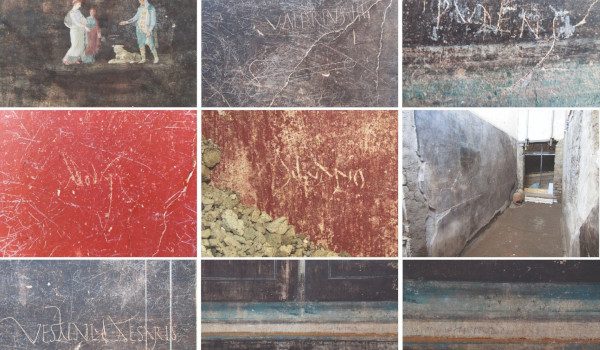“HIC ET UBIQUE”- Voices and lives in the ‘Salone Nero’ (black banqueting room)
A Latin motto that spans the centuries, from Pompeii to Shakespeare
A new article has been published in the E-Journal of the excavations of Pompeii that examines some of the recent finds from the site in Regio IX, insula 10 at Pompeii, where archaeological investigations are currently underway as part of the work designed to safeguard and improve the hydrogeological structure of the excavation faces.
The numerous graffiti recently brought to light in the salone nero (black banqueting room) and in several nearby rooms have been analysed, shedding light on many aspects of life in Pompeii.
The graffiti are inscriptions incised on walls and signed by the people who frequented these places and left traces of their presence.
As well as painted names (in Greek) found alongside depictions of Helen and Paris, there is the incised name of a person called Pudens; the written name of Vesbinus and the crudely scrawled name of a man named Valerius, while a greeting was meant for Silvanus; there are also traces of a man or a woman called Modest- (Modestus? Modesta?). Another greeting may stem from the fact that a person had wished someone else, possibly the owners of the house, happiness and wellbeing hic et ubique. Hic et ubique, ‘here and everywhere’, is a formulaic expression known also exclusively from the walls of Pompeii, linking the ancient city to Shakespeare by means of a liturgical prayer. Hic et ubique is the opening phrase uttered by the Shakespearean character Hamlet when addressing the ever-present ghost of his father (“Hic et ubique? Then we’ll shift our ground”). This is what emerges from the reading and interpretation of the authors of the article Maria Chiara Scappaticcio, Professor of Latin language and literature at Federico II University of Naples and Gabriel Zuchtriegel, Director of the Archaeological Park of Pompeii.
All the latest information from the E-journal of the excavations published today in https://pompeiisites.org/e-journal-degli-scavi-di-pompei/ and in the official Academia.edu platform of the Archaeological Park of Pompeii https://independent.academia.edu/ParcoArcheologicoPompei



